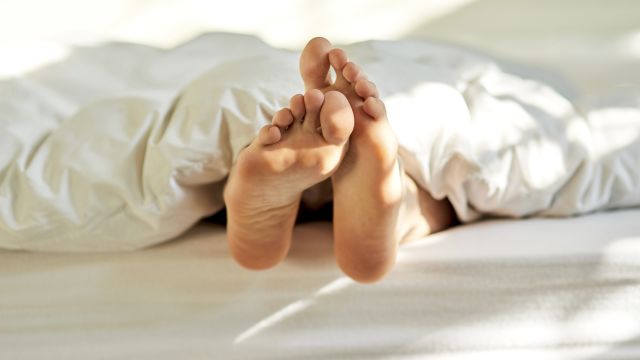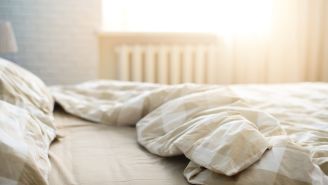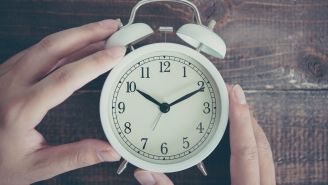Ever feel like you’re free-falling in your sleep? Or experience a random twitch right before dozing off? According to the National Sleep Foundation, 70% of people will experience these sensations. And while researchers haven’t been able to pinpoint exactly why these hypnic jerks happen, they have a few working theories.
Sleep specialist William Cook, MD, of Summerville Medical Center in South Carolina explains what these jerks really are and how to minimize their frequency.
The sensations are called hypnic jerks.
Hypnic jerks can cause a variety of feelings. “Usually it's a contraction of the limbs and sometimes it's a sensory thing. In other words, instead of a body jerk, you may have a sudden sensation like you're falling, a sudden flash, or a sudden vivid dream or hallucination,” says Dr. Cook.
Cook says the sudden brief contract of the limbs—usually the legs—can also involve the arms and happens just before you fall asleep. Sometimes the movement or feeling may wake you up, but other times you may just remember it the next day.
One theory finds that hypnic jerks happen during the natural downshifting of the nervous system, just as you’re falling asleep. As you’re falling asleep, your breath and heart rate slow down, your body temperature becomes cooler, your muscles shift, which triggers the twitches.
Another theory involves how the brain reacts to falling sleep. It finds that when your muscles relax while trying to go to sleep, your brain thinks you’re falling causing the muscles to tense up for protection.
Certain habits may make them worse.
Experts are uncertain of exactly what causes hypnic jerks, but stimulation is thought to be a main factor. Here are the five things that sleep specialists think contribute to hypnic jerks:
- Exercising before bed
- Caffeine
- Stress
- Sleep deprivation
- Smoking
- Stimulant medications like Adderall
You probably don’t need to worry.
The occasional hypnic jerk is nothing to worry about, but if they are becoming excessive, they can cause insomnia, says Cook.
In addition to insomnia, hypnic jerks can also be a side effect of other medical conditions, too. “Excessive hypnic jerks have been reported in people with Parkinson's disease, and in people with post-polio syndrome,” says Cook.
It may be another condition.
While hypnic jerks are common and manageable, you may be confusing the sensations with these other health conditions.
Restless legs syndrome is a condition that can makes your calves and thighs feel like they are throbbing, pulling or creeping around bedtime. The uncomfortable feeling normally gets better if you get up to walk, but if the symptoms are causing sleep problems, your doctor may suggest vein treatment or medication like gabapentin enacarbil.
Periodic limb movements can cause your lower limbs to jerk every 20 to 40 seconds for up to a few hours. If you’re experiencing both restless leg syndrome and periodic limb movements, your doctor may suggest medications like dopamine agonists.
So, what can you do?
Most hypnic jerks are not signs of another health condition, but if you notice that they’re increasing or you start to lose sleep because of them, changing your habits can help.
Limit strenuous exercise before bed: Regular exercise can actually improve sleep duration and quality. But Cook says he always tells his patients to avoid exercising before bed because it can make it hard to go to sleep and can lead to hypnic jerking.
Watch your caffeine intake: Caffeine affects everybody differently, and can stick around in the body for up to seven hours. Keep that in mind before reaching for that second cup of afternoon joe.
Try to relax: To reduce your stress levels at bedtime, practice relaxation techniques like deep breathing and yoga. If your mind starts racing with to-do’s as soon as your head hits the pillow, keep a list by your bed to write down your thoughts.
“Basically, it's a matter of the stimulants. If you can cut back on emotional stress and intense exercise before bed, that will hopefully make them better,” says Cook.
If your sleep sensations continue and are interfering with your sleep on a regular basis, it may be time to see a sleep specialist. Cook says most of the time a sleep study is not necessary to diagnose hypnic jerks. “The doctor can prescribe a medication like clonazepam to help,” he adds.
Medication isn’t recommended for people who have one or two hypnic jerks every few months. Doctors only prescribe medication to people who experience the jerks regularly and people who are having trouble sleeping. For the infrequent hypnic jerks, simply roll over and move around a bit to shake it off.






